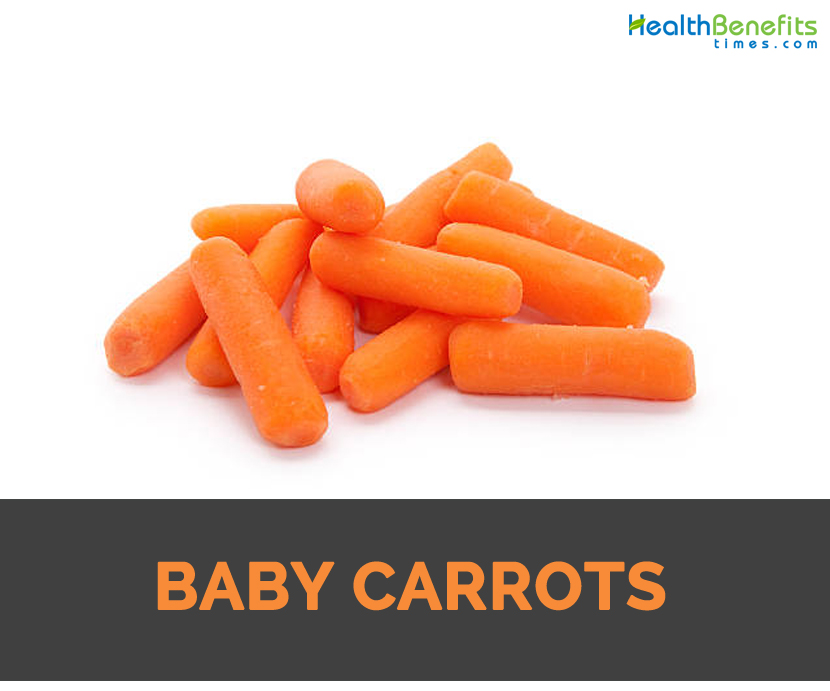| Baby carrots Quick Facts | |
|---|---|
| Name: | Baby carrots |
| Colors | Bright orange |
| Taste | Sweet |
| Calories | 4 Kcal./cup |
| Major nutrients | Vitamin A (9.86%) Iron (1.13%) Copper (1.11%) Vitamin B6 (0.85%) Vitamin B5 (0.80%) |
Health Benefits of Baby carrots
Some health benefits of baby carrots are presented below:
- Source of vitamin A
Carrots of all sizes contain Vitamin A. The serving size of a cup encompasses 21384 IU of Vitamin A which is nearly 10 times recommended daily allowance for women. Vitamin A ensures vision health, healthy skin and stronger immunity. Further it is required for reproduction of cells and also involves in bone formation. Vitamin A is available in form of beta-carotene which is converted to Vitamin A at the time of digestion.
- Fiber content
A cup of baby carrots offers 3.6 grams of dietary fiber i.e. more than 10 percent of the amount required for a day. Fiber supports digestion and adds bulk to the stool. Diet rich in fiber are associated to lowering the levels of cholesterol, chances of colon cancer and diabetes. Foods rich in fiber manage weight, slowing digestion that promotes satiety.
- Vitamin K
Vitamin K is regarded as a crucial vitamin required for production of bone proteins and blood clotting. A cup of baby carrots offers 17 mcg of Vitamin K. Adult women must get 90 mcg of vitamin K per day. The sources of vitamin K include dark and leafy greens such as spinach, kale and turnip greens, soybean oil and broccoli.
- Vitamin C
A cup of baby carrots offers 7.6 milligrams of vitamin C i.e. 10 percent of daily requirement for women. The body requires Vitamin C for bodily functions such as cell repair, immune support and wound healing. This nutrient helps to absorb iron from foods that is crucial for menstruating women. It’s a myth that intake of Vitamin C helps to prevent colds. Though intake of vitamin C supplements daily lowers the duration of colds, it do not prevent its occurrence and shows no effect on the existing one.
- Prevention of heart problems
Study shows that diet rich in carotenoids are related with reducing the chances of heart ailments. Besides beta carotene, it contains lutein and alpha-carotene. The daily intake of carrots lowers the cholesterol levels as soluble fibers bind with bile acids.
- Cleanses body
Vitamin A supports liver in eliminating toxins from the body. It lowers bile and fat in the liver. Fiber found in carrots cleanses colon and speeds up the movement of waste.
- Healthy teeth and gums
Carrots clean the mouth as well as teeth. Like toothbrushes and toothpaste, it scrapes off food particles and plaque. It stimulates gums and triggers saliva as being alkaline balances acid forming or cavity forming bacteria. Also the minerals help to prevent tooth damage.
- Stroke prevention
People consuming five carrots a week have fewer chances to suffer from a stroke than those consuming fewer carrots.
Culinary uses
- It could be blanched, sautéed, steamed, roasted and consumed raw.
- Add it to soups, sauces and stews.
Precautions
Some might experience allergic reactions such as vomiting and diarrhea then discontinue using.
How to select and store carrots?
Select:
- Look for the fresh carrots.
- Avoid carrots with excessive hair like roots, scaly surface growth and puncture marks.
Storage:
Soak carrots in water for about 5 minutes in order to eliminate soil particles. Then wash it thoroughly. Dry it with a kitchen towel and put it in an airtight ziplock bag for refrigeration. Also, it could be chopped and placed in a bowl and cover it with cling film before it is stored in a refrigerator.
References:
https://en.wikipedia.org/wiki/Baby_carrot
https://parenting.firstcry.com/articles/carrot-for-babies-when-to-introduce-benefits-and-recipes/
https://www.recipetips.com/glossary-term/t–37457/baby-carrots.asp
https://www.thespruceeats.com/questions-and-answers-about-carrots-996179
https://healthyeating.sfgate.com/baby-carrots-same-nutrients-large-carrots-8175.html
Comments
comments
